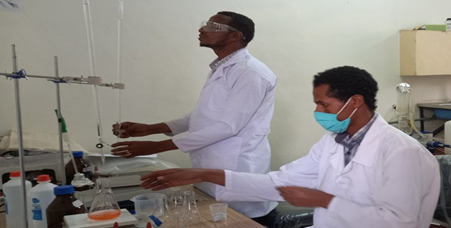ACEWM successfully completed water and material testing laboratory capacity building project
Ethiopia lacks specialized water analysis laboratories and as a result, is forced to send samples to reference laboratories in other countries. To address this challenge the Government of the Federal Democratic Republic of Ethiopia has established the Ethiopian Water Technology Institute (EWTI) in 2013 (Council of Ministers Regulation No. 293/2013) with the aim of providing management, best practices, research, capacity building, and technology transfer in the water sector. EWTI aspires to be a center of excellence in capacity building and technology transfer in the water sector in East Africa by 2025. The mission of EWTI is to realize nationwide rapid development in the water sector through capacity building, research, and study for technology transfer, specialized laboratory, and competence services that improve the sector’s overall implementation capacity.
One of the mandates of EWTI is to establish and provide specialized laboratory services by identifying the gaps of other institutions operating in the sector.” Accordingly, the laboratory has undertaken major activities in line with the vision and mission of EWTI. Among the major milestones achieved since its establishment is the construction of a laboratory building and procurement of some laboratory equipment.
The specialized laboratory is expected to be equipped with facilities that meet the international standard for Physico- chemical, biological, toxicological, radioactivity, materials testing, and soil testing for irrigation design.

Image source: Ethiopian Water Technology Institute (EWTI) Facebook page
The two-story laboratory, which lies on 1,770 m 2 of land, is now ready for operationalization. To equip the specialized laboratory with cutting-edge facilities, EWTI requested the Africa Centre of Excellence for Water Management (ACEWM), Addis Ababa University to provide technical support for the establishment, operation, and management of water, material and soil testing laboratories.
Accordingly, ACEWM entered into a contractual agreement with the EWTI on February 7, 2022; to undertake consultancy service on Capacity Building of Specialized Laboratory for water, soil, and material testing. The ACEWM has organized high-level experts in the field to undertake the tasks described in the ToR. The team used national and international experiences to specify test parameters and test methods, required laboratory instruments, cost of the instruments, and tariffs to undertake each test.
The selection of an analytical method is largely based on the analytical capability needs of the country, resource requirements, and internationally accepted procedures and protocols for physical, chemical, biological, materials, and soil testing. The basis for the selection of analytical methods is the complete procedures provided, along with appropriate Quality Assurance/ Quality Control (QA/QC) procedures, which are essential for Standard Operating Procedures (SOP) development essential for a high standard water quality laboratory. It is also anticipated that the Specialized Laboratory will be an internationally accredited laboratory for testing.
The estimated price for analytical testing service tariff for each service was calculated based on the various fixed and variable costs such as equipment purchases (as depreciation cost), utilities (as electricity, and water), test supplies, consumables, waste management, and manpower cost. The suggested laboratory setup was proposed based on general laboratory requirements as well as specific requirements for the different laboratories planned by EWTI.
The laboratory Information Communication Technology (ICT) Infrastructure is prepared using standard terminologies and tools so that any structured cabling professional or firm would easily understand and carry out the works that are stipulated in the design section of this document. This document will also serve as a framework and working document for the ICT unit of the institute to procure the network and infrastructure development project of the laboratory.

